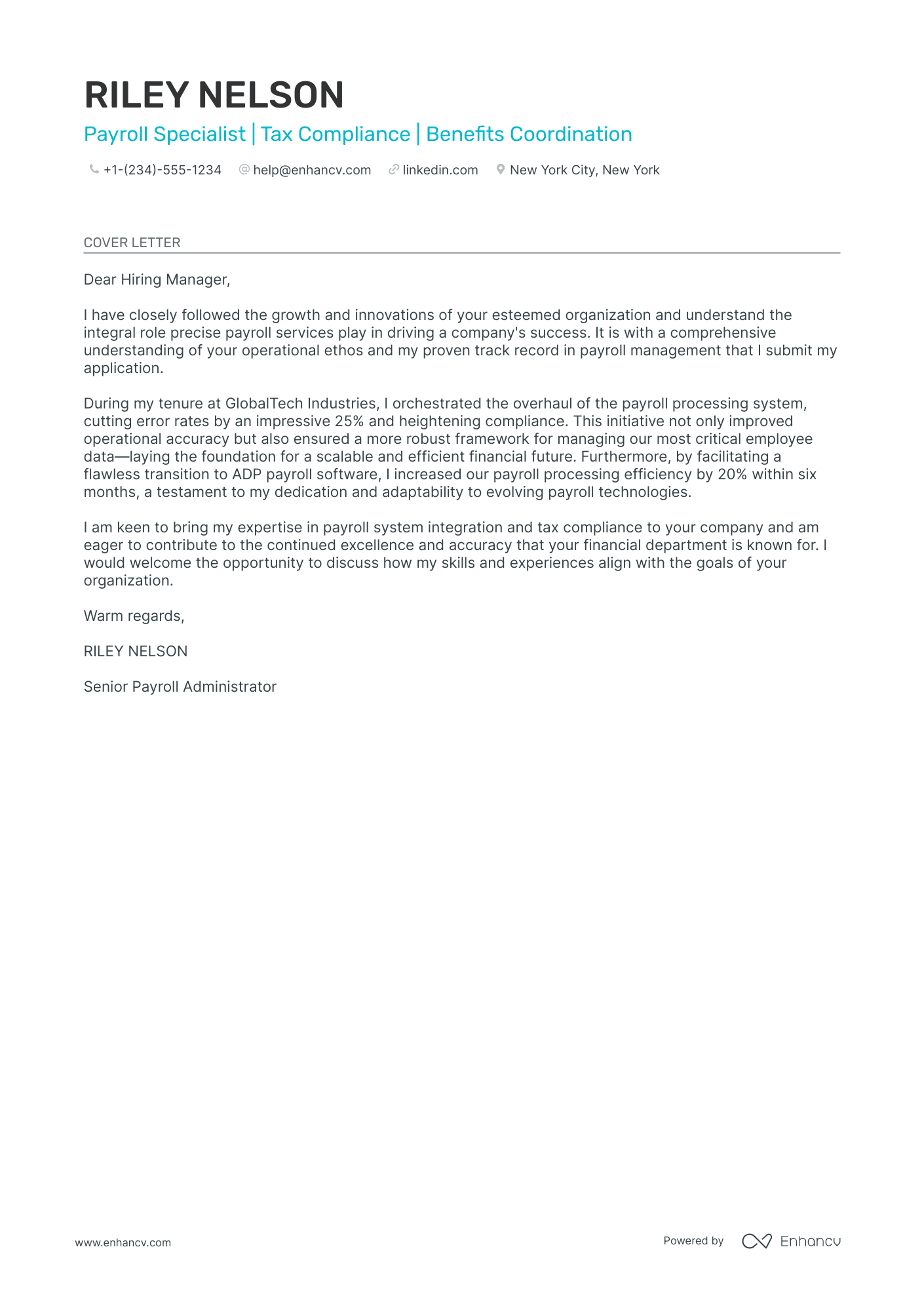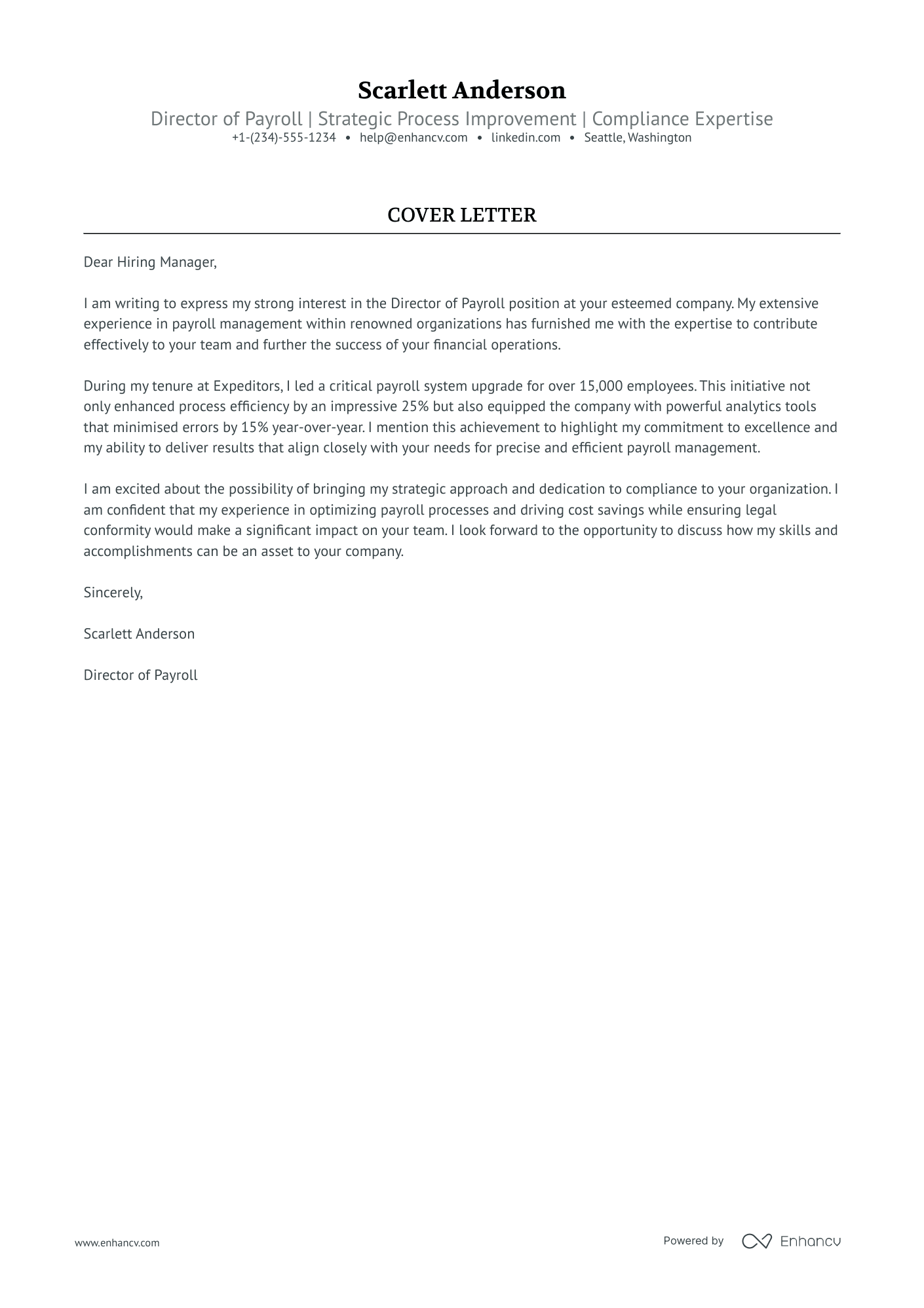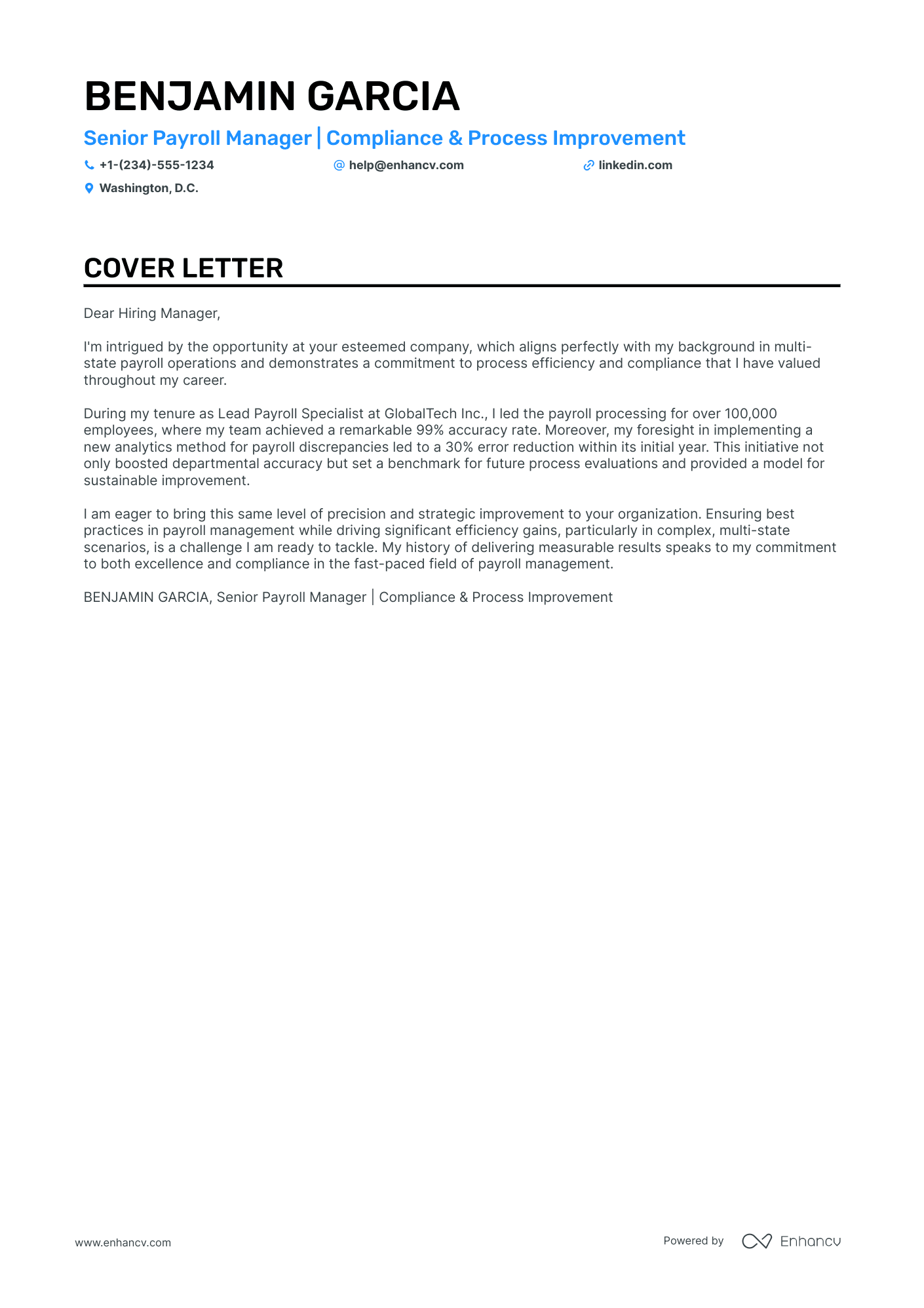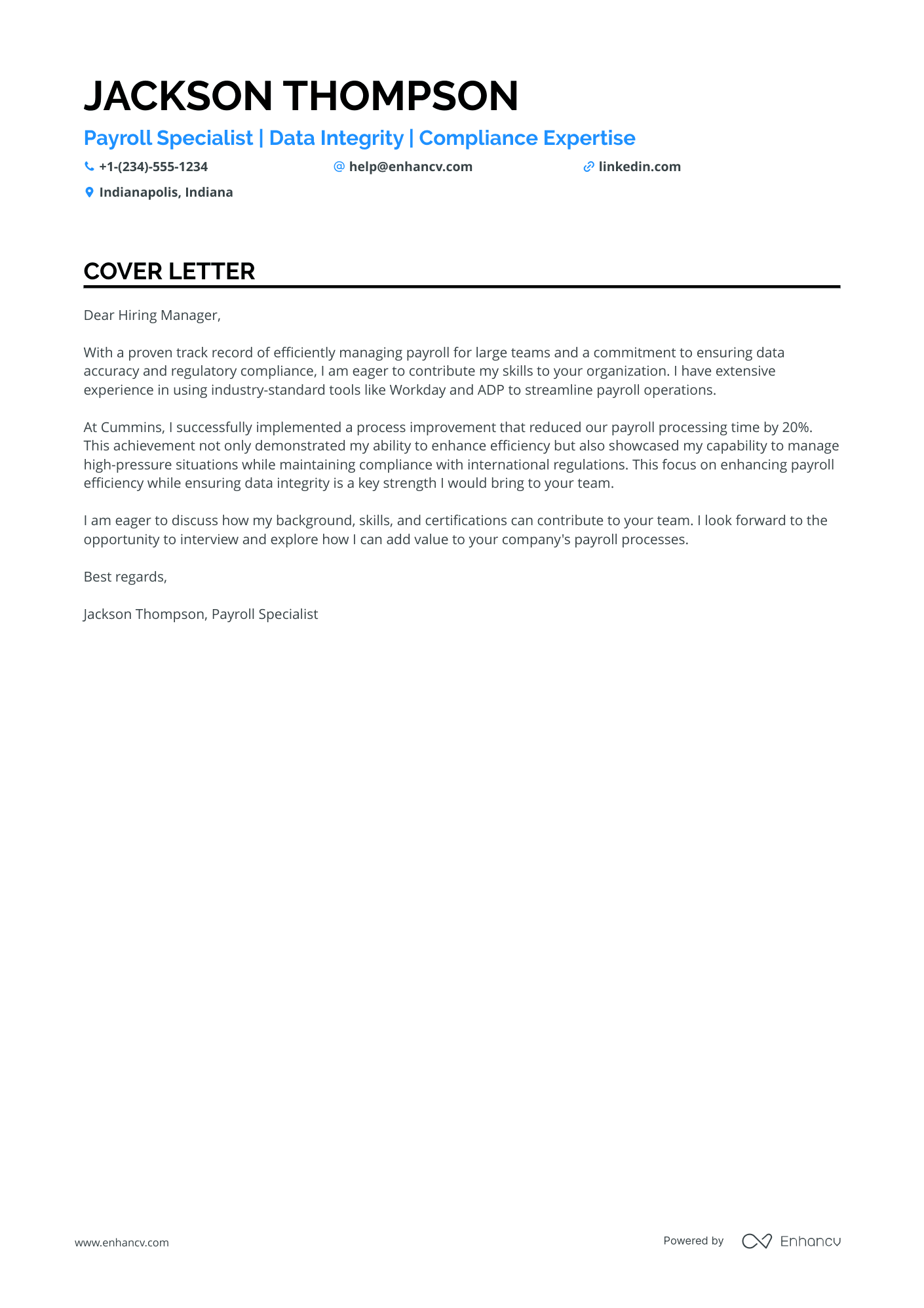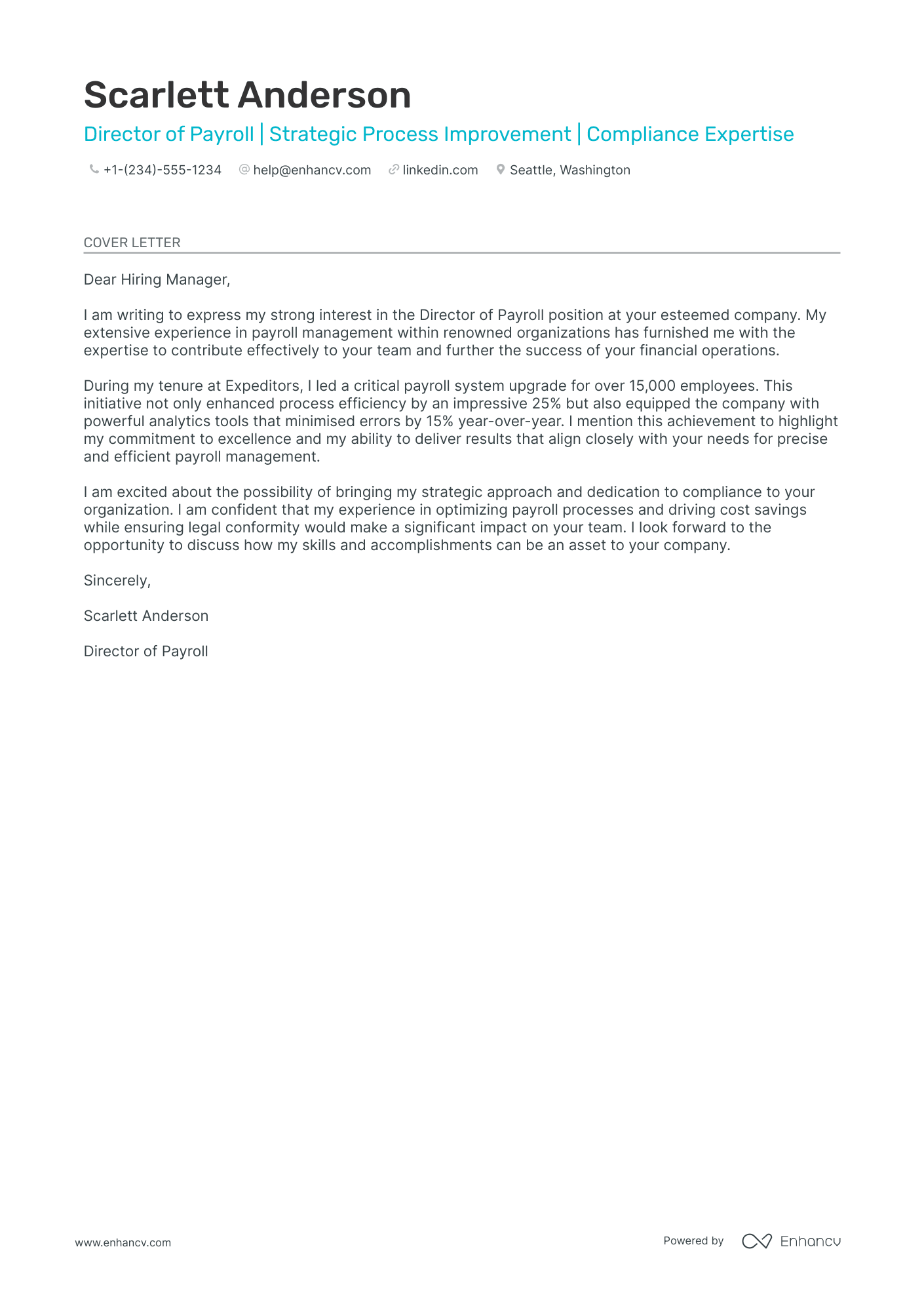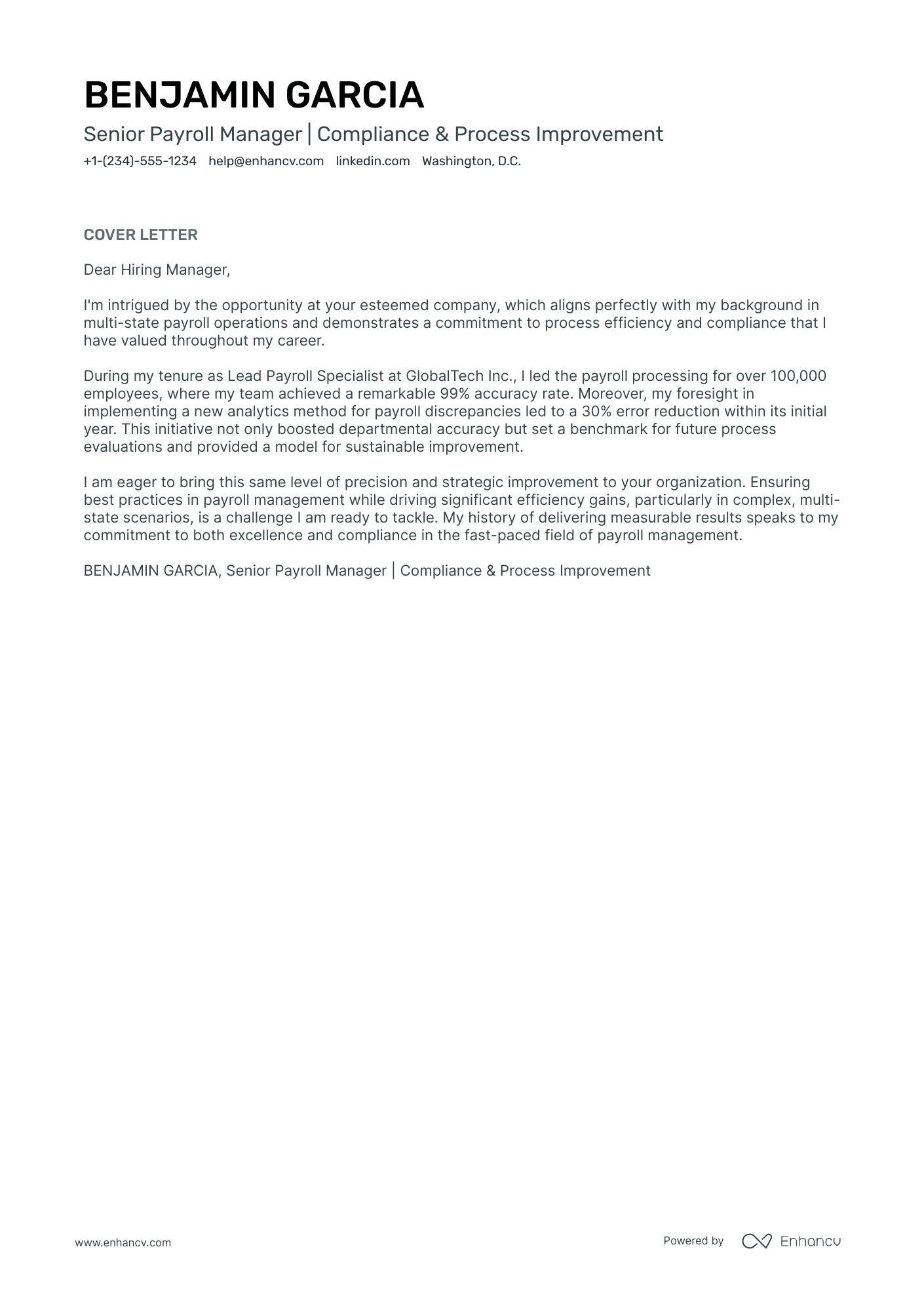Crafting a compelling payroll cover letter can be a daunting task, especially when you’re in the throes of job applications and find yourself staring blankly at the screen, unsure how to begin. You know your cover letter shouldn’t be a repeat of your resume, yet how do you distill years of experience into one impactful narrative? The key is to weave your proudest professional moment into a story that’s both authentic and engaging, steering clear of worn-out clichés. And remember, brevity is crucial; an effective cover letter is a concise showcase of your achievements, not exceeding one page. Let’s dive into how you can master the balance between formality and genuine passion in your payroll cover letter.
- Introduce your profile to catch recruiters' attention;
- Use professional templates and examples to make sure your payroll cover letter follows the best industry standards;
- Settle on your most story-worthy achievement to shine a light on what makes your application unique;
- Write a payroll cover letter, even when you lack professional experience.
Ready to start with the basics: upload your resume to Enhancv's AI, below, to see the payroll cover letter it would write for you.
If the payroll isn't exactly the one you're looking for we have a plethora of cover letter examples for jobs like this one:
- Payroll resume guide and example
- Staff Accountant cover letter example
- Accounts Payable Specialist cover letter example
- Stock Broker cover letter example
- Fund Accountant cover letter example
- Compensation Analyst cover letter example
- External Auditor cover letter example
- Compliance Analyst cover letter example
- Entry Level Actuary cover letter example
- Deloitte cover letter example
- Financial Analyst cover letter example
Drop your resume here or choose a file.
PDF & DOCX only. Max 2MB file size.
Payroll cover letter example
Johnatan Wright
Oakland, NJ
+1-(234)-555-1234
help@enhancv.com
- Demonstrating relevant experience: The cover letter emphasizes the applicant's previous role and a specific, quantifiable achievement ("streamlined month-end operations… reducing report processing times by 30%"), which is pertinent to the Payroll Specialist position.
- Emphasizing technical proficiency: The candidate highlights proficiency in essential payroll tools such as QuickBooks and MS Excel, which are crucial for the role and convey the applicant's capability to manage payroll tasks effectively.
- Citing impactful contributions: The applicant mentions the development and management of a tax reporting system, showing initiative and the ability to lead projects that have positive, measurable outcomes for the employer.
- Expressing eagerness for an interview: The cover letter concludes with a strong call to action, expressing a keen interest in discussing how the candidate's skills can contribute to the company, which helps in indicating genuine enthusiasm for the position.
Five tips on formatting your payroll cover letter
Do you want to make a good impression on recruiters and, at the same time, follow the best industry advice on writing your payroll cover letter?
Make sure to include the following:
- Header and Salutation;
- Introductory paragraph;
- Body paragraph;
- Closing paragraph;
- Signature (this one is up to you).
Remember to use the same modern, simple font for your payroll cover letter as you did for your resume (e.g. Lato, Rubik, etc.)
Ensure your payroll cover letter is single-spaced and is wrapped around a one-inch margin, like in our cover letter templates.
Once completed, use our cover letter builder to export your payroll cover letter in the best format to keep your information intact - PDF.
At the end of the day, your payroll cover letter won't be assessed by the Applicant Tracker System (ATS) software, but by the recruiters. Your information should thus be legible, organized, and follow a structured logic.
Why worry about your cover letter? Create one instantly using our free cover letter generator.
The top sections on a payroll cover letter
- Header: Include your name, address, phone number, email, and the date to ensure the recruiter has your contact information immediately, and knows the cover letter is up to date.
- Greeting: Address the hiring manager by name if possible to personalize the cover letter and demonstrate that you’ve done research on the company.
- Opening Paragraph: Introduce yourself by mentioning your current role, your interest in the payroll position, and a brief statement about your relevant experience and skills in payroll systems and processes.
- Body Paragraphs: Detail your payroll experience, including any specific software proficiency and accomplishments related to payroll accuracy, compliance, and efficiency, to show your capability in handling payroll responsibilities.
- Closing Paragraph: Express your enthusiasm for the role, reiterate the value you can bring to the payroll team, and invite the recruiter to review your enclosed resume and meet for an interview to discuss your qualifications in more detail.
Key qualities recruiters search for in a candidate’s cover letter
- Attention to Detail: Ensuring accuracy in payroll calculations, tax withholdings, and benefits disbursement is critical to avoid legal issues and employee dissatisfaction.
- Strong Numerical Skills: Proficiency with numbers is essential for calculating pay based on hours worked, commissions, bonuses, and for making necessary adjustments.
- Confidentiality: Ability to handle sensitive employee data with discretion, as payroll information is personal and must be kept secure.
- Knowledge of Payroll Systems and Software: Familiarity with payroll software (like ADP, Paychex, or QuickBooks) is important for efficiency and accuracy in processing payroll.
- Understanding of Compliance and Tax Law: Keeping abreast of current tax laws and regulations to ensure the company remains compliant with all federal, state, and local tax requirements.
- Time Management and Organization: Being able to manage payroll schedules, adhere to deadlines, and organize records effectively to handle the periodic nature of payroll tasks.
How to start your payroll cover letter: with a greeting, of course
Have you ever considered just how powerful a personalized salutation can be?
We sure have news for you! Your payroll cover letter should start with the right salutation to recruiters, nurturing a sense of respect and individuality.
Greet recruiters by using their first name (e.g. "Dear Tom" or "Dear Patricia") if you've previously established contact with them.
Otherwise, opt out for the less familiar, "Dear Ms. Peaches" or "Dear Ms Kelsey", if you've found the recruiter's name on LinkedIn or a corporate website.
"To whom it may concern" is never a good option, as it creates a sense that you've been sending out your payroll cover letter to anyone. Instead, use "Dear HR team" or "Dear (company name) recruiter" for a feeling of exclusivity.
List of salutations you can use
- Dear Hiring Manager,
- Dear [Company Name] Recruitment Team,
- Dear [Full Name],
- Dear [Mr./Ms./Dr.] [Last Name],
- Dear [Job Title or Department] Search Committee,
- Dear [Company Name] Team,
Get creative with your payroll cover letter introduction
Recruiters are going to assess plenty of candidate profiles for the role. Thus, anything you do to stand out will win you brownie points.
Use your payroll cover letter introduction to share something memorable about your experience.
But before you go down the rabbit hole of creativity and humor, align your message with the company culture.
For example, if you are applying for a role in some startup, use those first two sentences to tell a funny story (about your experience) to quickly connect with the recruiter.
The middle or body of your payroll cover letter body: a great instrument to tell a story
Now that you've set the right tone with the greeting and introduction of your payroll cover letter, it's time to get down to business.
Hear us out, the body of your payroll cover letter is the best storytelling instrument you have, in your job-hunting arsenal.
Writing the next three to six paragraphs, take the time to reassess the advert to discover job-crucial requirements.
Next, choose one accomplishment that covers those key skills and talents.
Use precisely that achievement to tell an exciting story of how you match the ideal candidate profile.
In the undertones of your story or payroll cover letter body, hint at the difference you'd make and sell your application as the perfect one for the job.
A sincere and original way to end your payroll cover letter
When writing their payroll cover letter, candidates tend to use one of these phrases, "Sincerely yours" or "I look forward to hearing from you".
Both statements show good manners, but your cover letter should end in a more actionable manner.
Write about:
- how you see yourself growing in the role/organization;
- the benefits you would bring about (you'd impress even more with tangible metrics);
- the next steps in the process (provide your availability for interviews).
Payroll cover letter advice for candidates with no experience
If you're worried about writing your Payroll cover letter and have no professional experience, we sure have some advice for you.
Turn recruiters' attention to your transferable or relevant skills gained thanks to your life and work experience.
Instead of writing about past jobs, focus on one achievement (whether from your volunteering experience, education, etc.) and the skills it has helped you build.
Alternatively, you could focus your Payroll cover letter on your career objectives and goals. Always remember to make those relevant to the job you're applying for by detailing how you see yourself growing as part of the company.
Recruiters would be way more impressed with candidates who fit the job profile and can bring about plenty of skills and vision to the table.
Key takeaways
Turning your payroll cover letter into a success is all about staying authentic to yourself and relevant to the job:
- Be creative with your payroll cover letter introduction by stating something you enjoy about the company (that is genuine) or about your skill set (to get the recruiters' interested);
- Use single spacing and have a one-inch margin wrapping all around the content of your payroll cover letter;
- Select just one past achievement from your career or life to tell a story of how you've obtained job-crucial skills and how they'd be beneficial to the role;
- The finishing paragraph of your payroll cover letter doesn't necessarily have to be a signature but could be a promise of what you plan to achieve in the role;
- Instead of focusing on your lack of experience, spotlight your transferable skills, one relevant achievement, and career dreams.
Payroll cover letter examples
By Role
Payroll Admin
Payroll Director
Payroll Manager
Payroll Specialist
- Emphasize Experience with Relevant Tools: The cover letter mentions experience with industry-standard payroll tools like Workday and ADP, which signals familiarity with the software likely used in the new role.
- Showcase Successful Past Performance: Highlighting the achievement of implementing a process improvement that reduced payroll processing time by 20% demonstrates capability and a results-driven approach.
- Maintain Focus on Compliance and Accuracy: Stressing the commitment to data accuracy and regulatory compliance is crucial for a payroll specialist role, emphasizing attention to detail and adherence to legal standards.
- Close with a Call to Action: Expressing eagerness to discuss potential contributions in an interview encourages further engagement and reinforces interest in the position.
